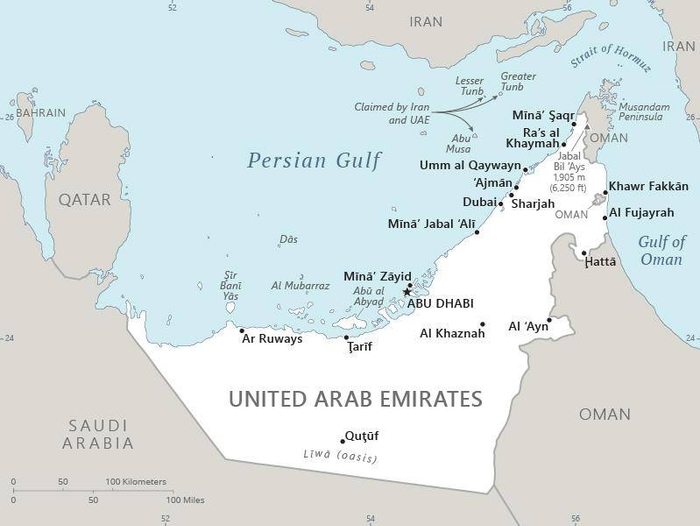173 United Arab Emirates

Three equal horizontal bands of green (top), white, and black with a wider vertical red band on the hoist side. The flag incorporates all four Pan-Arab colors, which in this case represent fertility (green), neutrality (white), petroleum resources (black), and unity (red). Red was the traditional color incorporated into all flags of the emirates before their unification.
Flag courtesy of the CIA World Factbook

Map courtesy of the CIA World Factbook

Abu Dhabi camel.
Photo courtesy of the CIA World Factbook
Government
According to Britannica, the highest governmental authority is the Federal Supreme Council, which is composed of the quasi-hereditary rulers of the seven emirates. The president and vice president of the federation are elected for five-year terms by the Supreme Council from among its members. The president appoints a prime minister and a cabinet. The unicameral legislature, the Federal National Council, is an advisory body made up of 40 members appointed by the individual emirates for two-year terms. A provisional constitution was ratified in 1971 and was made permanent in 1996 by the Supreme Council.
The United Arab Emirates has a federal system of government, and any powers not assigned to the federal government by the constitution devolve to the constituent emirates. Generally, the distribution of power within the federal system is similar to those in other such systems—for example, the federation government administers foreign policy, determines broad economic policy, and runs the social welfare system—and a significant amount of power is exercised at the individual emirate level, notably in Abu Dhabi and Dubai.
The constitution calls for a legal code based on Sharīʿah (Islamic law). In practice, the judiciary blends Western and Islamic legal principles. At the federal level the judicial branch consists of the Union Supreme Court and several courts of first instance: the former deals with emirate-federal or inter-emirate disputes and crimes against the state, and the latter cover administrative, commercial, and civil disputes between individuals and the federal government. Other legal matters are left to local judicial bodies.
General Civil Aviation Authority (GCAA)
The General Civil Aviation Authority (GCAA) was created in 1996 by Federal Cabinet Decree (Law 4) to regulate Civil Aviation and provide designated services with observance to aviation safety and security to strengthen the aviation industry within the UAE and its upper space. Since 1996 the Authority has made considerable progress and embarked on bold new initiatives to provide a better service to its civil aviation clients and stakeholders. Since 1996 many new projects and innovations have been initiated with generally excellent result, such as modernization of the air traffic control center program, Radar equipments and establishing of new facilities to serve the growth of the civil aviation within the UAE.
Airspace
SkyVector – Google Maps – ADS-B Exchange
ICAO countries publish an Aeronautical Information Publication (AIP). This document is divided into three parts: General (GEN), En Route (ENR) and Aerodromes (AD). ENR 1.4 details the types of airspace classes they chose to adopt from classes A through G.
UAE AIP – requires login
Drone Regulations
CAR XII – EMERGING TECHNOLOGIES – CAR UAS
CAR-UAR – UNMANNED AIRCRAFT (UA) RECREATIONAL FLIGHT – ISSUE 02
CAR-UAEX – UNMANNED AIRCRAFT (UA) EXPERIMENTATION OPERATIONS – ISSUE 02 (CORRECTED)
CAR-UAEV – UNMANNED AIRCRAFT (UA) EVENT OPERATIONS – ISSUE 02
CAR-UAD – UNMANNED AIRCRAFT (UA) DEMONSTRATION OPERATIONS – ISSUE 02 (CORRECTED)
CAR-UAC – UNMANNED AIRCRAFT (UA) COMMERCIAL AND GOVERNMENTAL OPERATIONS – ISSUE 02
CAR – UA-ATO – UNMANNED AIRCRAFT APPROVED TRAINING ORGANISATIONS – ISSUE 01
There’s an APP for that!
Advanced Air Mobility (AAM) Regulations & Policies
2025 – UAE GCAA Unveils New Regulatory Framework for Vertical Flight Infrastructure
CAR XII – EMERGING TECHNOLOGIES – CAR AAM
CAR-UAM – URBAN AIR MOBILITY OPERATIONS – ISSUE 1
CAR IX – AERODROMES REGULATIONS – CAR HVD
CAR-HVD – On-shore (HELIPORTS-VERTIPORT) AND Off-shore (HELIDECK) – ISSUE 01
PART VFI – VERTICAL FLIGHT INFRASTRUCTURES ISSUE 01
Advanced Air Mobility (AAM) News
2025 – SkyDrive Establishes Strategic Partnership with Abu Dhabi’s Integrated Transport Centre
2025 – Archer showcases eVTOL flight tests in UAE
2025 – UAE advancing global regulatory standards for next-gen aerial mobility
2025 – Abu Dhabi Investment Office plans vertiport network
2025 – Falcon Aviation orders 50 eVTOL aircraft from AutoFlight
2025 – Joby, Skyports Ink Air Taxi Deal in UAE Emirate
2025 – UAE studies how to convert helipads into AAM infrastructure
2025 – ANRA Technologies opens office in Dubai
2025 – Dubai selects ANRA Technologies to build UTM platform
2025
Video courtesy of Advanced Air Mobility Institute from the July 2025 Global AAM Forum.
2025
Video courtesy of Advanced Air Mobility Institute from the July 2025 Global AAM Forum.
2025 – China’s TCab Technology wins US$1B order from UAE’s Autocraft for 350 E20 eVTOL aircraft
2025
2025 – Ajman Transport Authority to partner with Skyports on AAM
2025 – Archer Aviation begins test flights in Abu Dhabi
2025 – Joby marks Dubai flights and beginning of commercial market readiness work
2025 – Joby conducts electric air taxi trials in United Arab Emirates
2025 – GCAA publishes updated vertiport, heliport framework for UAE
2025 – Archer Aviation, Jetex to expand air taxi network in UAE
2025 – UAE Approves First ‘Hybrid Heliport’ Design for Abu Dhabi
2025 – Archer secures design approval for UAE’s first hybrid heliport
2025 – Archer obtains design approval for UAE’s 1st hybrid heliport
2025 – Lyte, Bluenest, LynePorts to develop vertiports in the Middle East
2025 – Dubai Helicopter Operator and SkyDrive Plan eVTOL Tourist Flights
2025 – ABU DHABI AVIATION TO BE 1ST ARCHER EVTOL OPERATOR IN UAE
2025 – Archer unveils Midnight “Launch Edition” commercialization program with Abu Dhabi Aviation
2025 – ADA to serve as launch operator for Archer Midnight eVTOL aircraft
2025 – Abu Dhabi Aviation To Be 1st Archer eVTOL Operator in UAE
2025 – UAE begins mapping corridors for air taxis and cargo drones
2025 – UAE Air Taxi Service Could Slip Into 2027
2025 – Vertiport Designs Revealed for AAM Operations in Abu Dhabi
2025 – UAE Commences Air Corridor Mapping for Autonomous Air Taxis & Cargo Drones
2025 – Skyports, LODD design advanced air mobility vertiports for Abu Dhabi
2025 – Skyports Receives Technical Design Approval for First Commercial Vertiport in UAE
2024 – Gulf States Seek Early Launch of eVTOL Air Services
2024 – Joby Announces Beginning of Work on First Dubai Vertiport
2024 – TCab Tech, Autocraft plan electric air taxi service in Middle East
2024 – AAM Institute to host vertiport planning and design training workshop in Abu Dhabi
2024 – eVTOL vertiport plans advance in the Middle East
2024 – Parkin and Skyports partner to shape the future of transport infrastructure in Dubai
2024 – Skyports to build eVTOL vertiports at Dubai parking facilities
2024 – Volar, Etihad Aviation Training to partner on AAM in UAE
2024 – Joby applies for eVTOL air taxi certification in UAE
2024 – Abu Dhabi Airports expands AAM agreement with Groupe ADP
2024 – Dubai Clears Air Chateau To Develop Vertiports
2024 – Dubai regulators clear Air Chateau to develop vertiports, heliports
2024 – Air Chateau places preorder for 10 Crisalion Integrity aircraft
2024 – AAM in the UAE
2024 – Skyports, GCAA to develop joint eVTOL, helicopter vertiports (VIDEO)
2024 – Global pivot toward advanced air mobility gains momentum in UAE
2024 – EHang Completes Passenger-Carrying eVTOL Demonstration Flight in UAE
2024 – Blade, Emirates partner on airline-to-helicopter connection
2024 – Skyports and Ras Al Khaimah to elevate tourism with electric air mobility
2024 – Archer inks deal to launch air taxi services in UAE by 2025
2024 – Joby to establish electric air taxi ecosystem in Abu Dhabi
2024 – UAE’s first operational vertiport for eVTOLs unveiled in Abu Dhabi
2024 – Dubai-Based Firm Acquires Over 100 Flying Cars
2024 – eVTOL firm FlyNow targets 2025 e-copter test flights in Saudi, UAE
2024 – Falcon and Archer Launch Abu Dhabi-Dubai eVTOL Flights
2024 – Skyports, RTA and Joby to launch air taxi service in Dubai
2023 – VPorts initiates certification process for its vertiports in Dubai
2023 – Foster + Partners, Skyports show preliminary design of Dubai vertiport
2023 – Skyports Infrastructure’s vertiport design approved for development in Dubai
2023 – EvFly, Al Shaheen Aviation Holding partner to advance UAE AAM operations
Short Essay Questions
Scenario-Based Question
You have been hired by a Drone Startup Company. Your boss has immediately assigned this job to you.
They need you to prepare a one-page memo detailing the legalities of using a drone to film camels in Abu Dhabi, pictured above.
They need you to mention any national laws and local ordinances.
They specifically want to know what airspace (insert pictures) you will be operating in and whether or not you need an airspace authorization.
Does it matter whether or not you are a citizen of the country?
Lastly, there is a bonus for you if, as you scroll through this chapter, you find any typos or broken links!
Short Essay Questions
- What are the drone categories?
- How is registration addressed?
- How is remote ID addressed?
- What are the model aircraft rules?
- What are the commercial drone rules?
- Are there waivers or exemptions to the rules? If so, for what?
- Would you share a link to an interactive airspace map?
- How is BVLOS addressed?
- How can you fly drones at night?
- How can you fly drones over people?
- Where do you find drone NOTAMs?
- What are the rules for drone maintenance?
- What are the rules for an SMS program?
- What are some unique rules not mentioned above?
- What are the C-UAS rules?
- What are the AAM rules?

